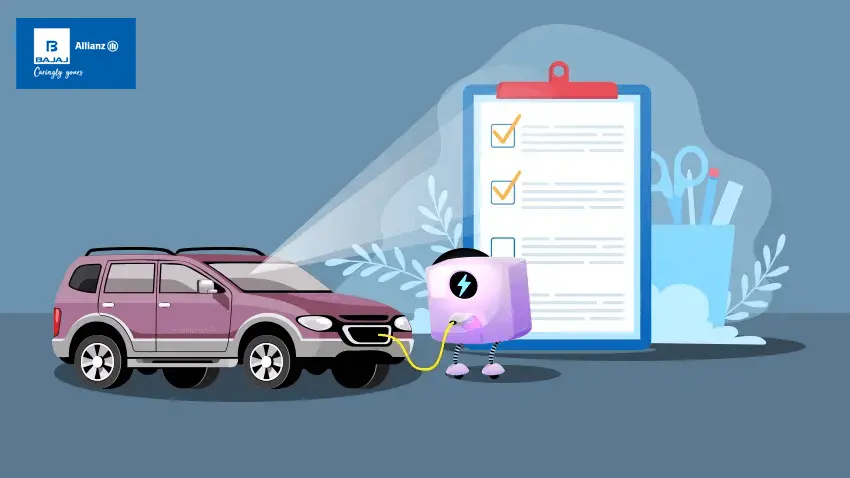An electric car insurance policy is a type of insurance plan aimed to provide protection to electric four-wheelers against a host of damage-causing events. As per prevailing laws, it is mandatory for all motor vehicles, including electric cars, to have an insurance plan that covers third-party liabilities. However, it is also recommended to have a comprehensive electric vehicle insurance plan to make sure your car receives all-round protection. Claims are subject to terms and conditions set forth under motor insurance policy. *
Despite its benefits, many people shy away from investing in a comprehensive plan as its premium tends to be higher than that of a third-party plan. However, understanding the factors that determine and impact the premium of a comprehensive plan can help out in this scenario. With that in mind, we list out those factors for your benefit.
Factors that Affect the Premium of Your Electric Car Insurance Policy
The following are the different characteristics that influence the premium for your electric car’s insurance policy:
-
The type of car being insured
One of the major determinants of the premium is the type of car that is to be insured under the plan. Insurance companies have information about each type of car model from different manufacturers and the risks it may be susceptible to. Based upon this information, the premium is decided by the insurance company (while keeping the other factors in mind).
Additionally, the premium may also be affected by how expensive the car is. High-end or luxury EVs tend to have a higher premium than their more affordable counterparts.
-
Insured Declared Value (IDV)
For the uninitiated, IDV is the maximum that the insurance company pays in the event of the total loss of the car. This may happen due to a serious accident, fire, or if the car is stolen and never retraced. In such cases, the insurer compensates the policyholder for the IDV amount that had been set during the purchase of the
electric car insurance plan. Claims are subject to terms and conditions set forth under motor insurance policy.
If the IDV is high, the premium would be higher as well, since the insurer is undertaking a larger amount of risk. By similar logic, a lower IDV can mean relatively lower premiums.
-
Additional coverage (add-ons)
You can enhance the financial protection provided by the EV policy by choosing add-ons. These are additional coverage aspects which provide coverage against events and situations that are usually not covered by the standard policy. *
Opting for add-ons can mean increased protection for your EV; however, it can also mean that you have to pay a higher premium. The premium for each add-on may differ. Some add-ons may be more cost-effective than others.
-
Geographical zone
The location in which your electric car is registered also has an impact on the premium of the insurance policy. If the car is registered in a metro city which comes under Zone A (eight metro regions of New Delhi Mumbai, Delhi, Bangalore, Chennai, Ahmedabad, Kolkata, Hyderabad, and Pune), then the premium may be high. Cars registered in the rest of India, which make up Zone B have lower premiums.
This is because the vehicle is likely to suffer more damage on the congested roads of a metro city as compared to a small town or village.
-
No-Claim Bonus (NCB)
It is a feature that allows you a concession on your upcoming premium if you do not make claims during the policy year. The NCB feature becomes valid from the second time the premium has to be paid. A unique aspect of the NCB is that it is cumulative, i.e., it keeps on getting accumulated if there are no claims made in consecutive years. *
Thus, the longer you do not raise a claim, the higher would be the concessions on the premium of your
electric vehicle insurance policy.
Claims are subject to terms and conditions set forth under motor insurance policy.
How to Reduce the Premium of Your EV Insurance Policy?
Now that the factors affecting the premiums of electric car insurance may be clear to you, let’s look at how you can reduce these premiums:
-
Opt for required coverage only
Make a list of the events and risks your EV is vulnerable to and customise the coverage according to those needs only.
-
Avoid making minor claims
If the damage is such that it can be taken care of easily, then avoid raising a claim for the same. This may help you build up a considerable NCB in the long run.
-
Install security devices
If you install certain devices in your electric car to increase its safety and efficiency, it may mean a lower premium in some cases.
The
benefits of buying electric cars in India are many and reduced energy cost is one of them. By taking a smart approach with your electric car insurance plan, you can lower your premiums and increase those benefits for yourself in the long haul.
* Standard T&C Apply.
Insurance is the subject matter of solicitation. For more details on benefits, exclusions, limitations, terms, and conditions, please read the sales brochure/policy wording carefully before concluding a sale.
 Service Chat:
Service Chat: 

